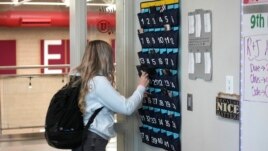23 July, 2024
More American states are pushing for cell phone restrictions in high schools. The move comes as teachers say it is a major problem in the classroom.
In July, Virginia became the latest in a growing number of U.S. states to restrict cell phone use in public schools. The state's governor, Glenn Youngkin, issued an executive order to establish guidance and policies for local school systems to follow by January.
Youngkin's order said, “Studies indicate that students who use their phones during class learn less and achieve lower grades.” It also cited an “alarming mental health crisis” among young people driven by the use of cell phones and social media.

FILE - A student places her cellphone into a phone holder as she enters class at Delta High School, Friday, Feb. 23, 2024, in Delta, Utah. (AP Photo/Rick Bowmer)
Last year, Florida became the first state to restrict the use of cell phones in school. A law that took effect in July requires all Florida public schools to ban student cell phone use during class time and block social media on the school's wi-fi.
The states of Indiana and Ohio passed their own laws this year. Several others, including Oklahoma, Vermont, and Kansas, have also recently introduced what is being called “phone-free schools” legislation. New York Governor Kathy Hochul said she will push for legislation to ban cell phone use in the coming legislative session in 2025.
Cell phone distraction
In a recent public study, the Pew Research Center reported that 72 percent of U.S. high school teachers say cell phone distraction is a major problem in the classroom.
Teachers report less of a problem with younger students. About 33 percent of middle school teachers and six percent of elementary school teachers see cell phone use as problematic.
The Associated Press (AP) reported that a California teacher complained of students watching Netflix during class. In Maryland, a teacher said students used gambling apps to place bets during the school day.
Many educators in the U.S. said students used social media, listened to music, and shopped online during the school day.
James Granger is a science teacher at a Los Angeles-area high school. He told the AP, “Students used to have an understanding that you aren't supposed to be on your phone in class. Those days are gone.” Granger added, “The only solution that works is to physically remove the cellphone from the student.”
Some students say such policies take away their independence and cut off their main method of communication with family and friends. Opposition also has come from parents who fear being cut off from their kids if there is a school emergency.
Jaden Willoughey is a student at Delta High School in rural Utah. He shares the concern about being out of contact with his parents if there is an emergency. But he also sees the upside, or good result, of turning in his phone at school.
At Delta High School, students are required to leave their phones at the door when entering every class. “It helps you focus on your work, and it's easier to pay attention in class,” Jaden said.
Kim Whitman is a leader of the Phone-Free Schools Movement, a group that advises schools. She told the AP she urges educators to make exceptions for students with special educational and medical needs.
Back in Virginia
Back in Virginia, school systems have been increasingly banning or severely restricting students' phone use.
For example, Loudoun County Public Schools, in northern Virginia, passed a new policy last month that generally bans elementary school students from using phones during the school day.
Middle school students are permitted to use their phones before or after school, but they are expected to store their phones in their lockers. In high school, students are expected to silence their phones and place them in storage during instructional time.
In Richmond, Virginia, the school system started a cell phone ban last year in some of its high schools and middle schools.
Jason Kamras is head of the Richmond school system. He said, “We saw more student engagement in class and fewer distractions throughout the day.” Additionally, he said, “Students reported spending more time talking with their peers.”
I'm Mario Ritter, Jr.
Hai Do wrote this report for VOA Learning English based on reporting from the Associated Press and Pew Research.
_______________________________________________
Words in This Story
indicate –v. to show or suggest something is the case
achieve –v. to reach a goal or do something that is notable
cite –v. to quote the direct words of someone else or facts that come from a source
wi-fi –n. (technology) a short distance wireless connection
distraction –n. the condition of having one's attention taken up by something that is not important at the time; a thing that is causing a loss of attention
gambling –n. the activity of playing games of chance for money
bet –n. the act of putting money at risk in an effort to win more money
locker –n. a space, especially in schools, where people can put things and secure them with a lock
engagement –n. the condition of taking part in an activity, like a class, and being involved in it
peer –n. a person who is equal with others and like them at work, in school, or in several other situations